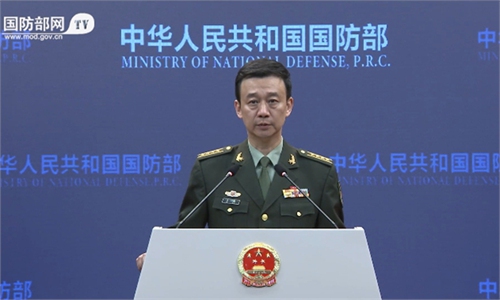Pentagon report hypes 'China threat' to sustain own hegemony
US urged to discard Cold War mentality, keep military, overall ties with China stable

China US Illustration: Liu Rui/GT
The US' "China Military Power report," like its previous editions, ignores the facts and is filled with bias, spreading the "China threat" theory which only serves as an excuse to maintain its military hegemony, a Chinese Foreign Ministry spokesperson said on Friday, in response to a Pentagon report that warned Beijing is building up its nuclear and long-range missiles arsenal "faster than previous projections."
The newly-released annual Pentagon document claimed that China has more than 500 operational nuclear warheads as of May 2023, surpassing earlier projections, and forecast that China would likely have more than 1,000 operational nuclear warheads by 2030.
Describing China as a "pacing challenge," the US Defense Department report also said that Beijing may be exploring the development of conventionally-armed long-range missiles that could reach the US. It said that Beijing has completed the construction of three new fields of long-range ballistic missiles silos.
Mao Ning, a spokesperson from the Chinese Foreign Ministry, said on Friday that China is firmly committed to a defensive nuclear strategy, and has always maintained nuclear forces at the lowest level required for national security, and has no intention of engaging in a nuclear arms race with any country.
China has a unique nuclear policy among nuclear weapon states and has maintained a high degree of stability, consistency and predictability, Mao said, "No country will be threatened by China's nuclear weapons as long as it does not use or threatens to use them against China."
We urge the US to abandon its Cold War mentality and hegemonic logic, to view China's strategic intentions and national defense development objectively and rationally, to stop publishing such irresponsible reports year after year, and to take practical actions to maintain the stability of the military-to-military and overall relations between the two sides, Mao said.
Chinese military expert Zhang Junshe said that it's hilarious that a country with more than 5,000 nuclear warheads says another nation poses a threat.
In 2020, Fu Cong, then director general of the Department of Arms Control and Disarmament, cited statistics from renowned international think tanks, pointing out that the US nuclear arsenal stands at about 5,800 nuclear warheads.
Even if China does have 500 nuclear warheads, they are not even close to the size of the US' arsenal. In addition, the number of US strategic nuclear submarines, strategic bombers, and the number of warheads they carry are far higher than any other country in the world, including China, Zhang remarked.
For fiscal year 2024, the US defense budget request hit another record high of $842 billion, more than the gross domestic product of Saudi Arabia for the entire year of 2021, and 20 percent higher than the combined defense budgets of nine countries, including China, Russia, India, and the UK, according to Xinhua.
According to Zhang, the US is developing a new generation of strategic nuclear weapons, including intercontinental ballistic missiles (ICBMs), sea-based strategic missiles and airborne nuclear weapons, a new generation of nuclear submarines, and strategic bombers.
In addition, the US is miniaturizing nuclear weapons for so-called tactical use, namely, lowering the threshold for the use of tactical nuclear weapons, Zhang said. "The US is also considering resuming the storage of nuclear weapons in other countries, such as the UK, a Cold War era practice of nuclear sharing with allies."
The hyping of the "China threat" is nothing but a search for excuses for Washington's uncontrolled nuclear arsenal expansion, and to discredit and suppress China's normal military development, so as to maintain absolute military superiority, Zhang said.
'Undesirable hobby'
The report smeared China's military modernization as a means of projecting power across the Pacific region and ultimately around the globe, saying China's strength is growing in all the domains of warfare, including the traditional land, air and sea, as well as nuclear, cyber and space, according to CNN.
The 212-page report also mentioned the word "Taiwan" 261 times, highlighting the Chinese mainland's "military pressure" against the island.
The US is worried that the increase of the Chinese People's Liberation Army's military capability could pose challenges to US military hegemony, thus affecting the US political hegemony and global hegemony, Chinese military expert and TV commentator Song Zhongping told the Global Times on Friday.
Given that the report was released ahead of the Beijing Xiangshan Forum, a China-hosted platform on defense and security issues, Chinese analysts believed it was also aimed at entrapping Chinese neighbors, cajoling them to resist and oppose China's normal military development so that they can be better "utilized" by the US in the Asia-Pacific region.
As the world's largest nuclear state, the US has not made a commitment not to be the first to use nuclear weapons, as China has done, as well as a commitment not to use nuclear weapons against non-nuclear countries and regions. Instead, the US has even been aggressive, emphasizing the pre-emptive use of nuclear forces, according to Zhang.
The nuclear strategy of the US is global in its scope. When it provides nuclear umbrellas and even nuclear sharing to some allies, it poses a serious threat to other countries, and at the same time is extremely destructive to nuclear disarmament and non-proliferation around the world, and ultimately exacerbates regional tensions, Song said.
In July, the US deployed a nuclear-armed ballistic missile submarine to South Korea for the first time since 1980s. North Korea later fired two short-range ballistic missiles into its eastern waters as a response to the "grave provocation," media reported.
The problem that the US poses to global security is its nuclear superiority and military power, said a Beijing-based expert. "When it comes to the resolution of regional crises, the US is inclined to resort to the use of force, either by itself or through its allies. And the US' absolute military strength and nuclear power has further encouraged that undesirable hobby."
"The US, with the largest and most advanced nuclear arsenal in the world, follows a first-use nuclear deterrence policy, keeps making enormous investment to upgrade its nuclear triad, advances forward deployment of strategic forces, and strengthens extended deterrence for its allies," Mao said. "These policies and acts heighten the risk of a nuclear arms race and nuclear conflict, and will only adversely affect the global strategic security environment."



